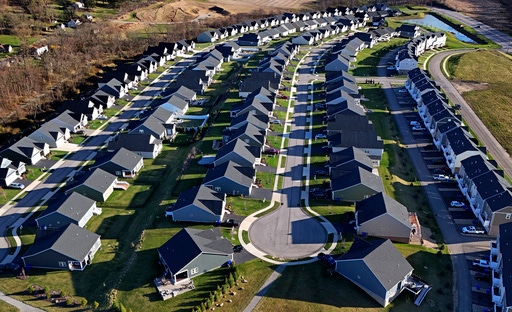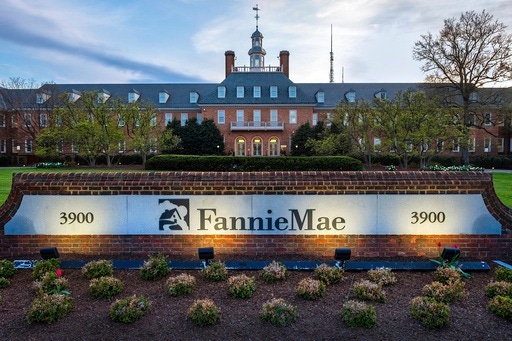Allies hope a Trump win changes the system for mortgages. Some warn it will make them pricier

FILE - A housing development in Middlesex, Pa., is shown on March 29, 2024. (AP Photo/Gene J. Puskar, File)[ASSOCIATED PRESS/Gene J. Puskar]
If Donald Trump wins the presidential election, Republicans hope he will fulfill a longstanding GOP goal of privatizing the mortgage giants Fannie Mae and Freddie Mac, which have been under government control since the Great Recession.
But Democrats and some economists warn that, especially in this time of high mortgage rates, doing so will make buying a home even more expensive.
Republicans contend the Federal Housing Finance Agency has been overseeing the two firms far too long, stymying competition in the housing finance market while putting taxpayers at risk should another bailout be necessary, like in 2008. President Donald Trump sought to free the two companies from government control when he was in office, but Joe Biden’s victory in 2020 prevented that from happening.
Democrats fear ending the conservatorship would cause mortgage prices to jump since Fannie Mae and Freddie Mac would need to raise fees to make up for the increased risks they would face without government support. The two firms guarantee roughly half of the $12 trillion U.S. home loan market and are a bedrock of the U.S. economy.
Project 2025, a handbook for the next Republican administration, includes a key call for the conservatorship to end, though Trump has sought to distance himself from the 920-page document, which was drafted by longtime allies and former officials of his administration.
“If his (Donald Trump’s) Project 2025 agenda is put into effect, it will add around $1,200 a year to the typical American mortgage,” Democratic presidential nominee Kamala Harris said during an August rally in North Carolina, building off of a 2015 analysis by economists Jim Parrott and Mark Zandi.
Parrott, a fellow at the Urban Institute, and Zandi, chief economist for Moody’s Analytics, concluded that a privatized Fannie Mae and Freddie Mac “would need to hold more capital against riskier loans … forcing them to either increase mortgage rates for these borrowers or lend less to them.” Ultimately, they found that privatization would cause rates for 30-year mortgages to rise between 0.43% and 0.97%. Applying that to the average homeowner’s mortgage balance of $244,500 in 2023, that would be about $730 to $1,670 more per year.
Parrott told The Associated Press he was surprised to see his analysis resurfaced nearly a decade later, but he stands behind it. “Privatization would cause a pretty significant spike in the cost of buying a home for most Americans,” said Parrott, who worked on the National Economic Council under then-President Barack Obama.
But to economist Mark Calabria, who headed the FHFA during Trump’s presidency, those fears are unfounded and the federal government has what he considers a “statutory mandate” to return the companies to private ownership.
“I didn’t find it to be a credible or compelling” argument, Calabria, now a senior adviser at the libertarian Cato Institute, said of Zandi’s and Parrott’s analysis.
Calabria said Fannie Mae and Freddie Mac are much more financially healthy now and it’s “completely doable” to remove them from conservatorship by 2027 once they raise the additional funds needed to strike out on their own.
“I don’t think there should be any concerns that suddenly mortgages will become more or less expensive,” Calabria said. “If you want to be able to strengthen our mortgage financial system so that we make sure that people are in reasonable, responsible loans and that we don’t have to bail out the mortgage finance system again, we need to fix Fannie and Freddie.”
Trump hasn’t said whether he wants to revisit ending the conservatorship, but in 2021 he lamented to Republican Sen. Rand Paul that his privatization effort had failed.
“My Administration was denied the time it needed to fix this problem,” he wrote to the Kentucky senator. The Trump campaign declined to comment Tuesday on whether Trump still wants to end the conservatorship.
Parrott said a key question is whether a privatized Fannie Mae and Freddie Mac would have a guarantee — either explicit or implicit — that the government would step in and rescue them if they failed.
How the Trump administration would handle that issue would dictate whether privatization is “only somewhat disruptive or dramatically disruptive,” Parrott said.
Before they were taken over in 2008, Fannie Mae and Freddie Mac were private companies but still enjoyed an implicit government guarantee — one that bailed them out after the collapse of the housing market and the wave of mortgage defaults.
The companies long ago paid back their $187 billion bailouts and have given the government tens of billions more in dividends. But the bailouts enraged Republicans and many are loathe to reinstitute such a guarantee, arguing the government should not be spending billions of dollars in taxpayer money to save mismanaged companies.
Without that guarantee, though, Parrott said there’s an “enormous risk that the market will not accept Fannie and Freddie’s privatization,” throwing the housing finance market into chaos and preventing all but those with “pristine credit” from being able to secure a mortgage — something Parrott called a “worst-case scenario.”
Calabria dismissed those fears and said there’s no need for a federal guarantee. Other huge firms the government bailed out during the 2008 recession, including Citibank, AIG and General Motors, remain public companies and haven’t needed a conservatorship, he said.
“The same set of law around Citibank exists for Fannie and Freddie — why are we treating them differently?” Calabria said. “There were implied guarantees behind the auto companies. We bailed out GM. Are people who are against the conservatorship ending also suggesting the government take over GM?”
With interest rates widely expected to continue to fall next year, Parrott believes those leading the Treasury Department under a new Trump presidency would realize the “market reality” that privatizing Fannie Mae and Freddie Mac will cause mortgage rates to bounce right back up.
For that reason, he’s skeptical that privatization will happen, even if the failure to go through with the plan would anger Trump allies who hold large shares in the two mortgage giants and stand to get a huge windfall should they be privatized.
“It would be a pretty hard pill to swallow as president that you’re going to have to tell homeowners that … you’re going to take steps that will crank the mortgage rate back up to where it was when everybody was in so much pain,” Parrott said.
Copyright 2024 The Associated Press. All rights reserved. This material may not be published, broadcast, rewritten or redistributed without permission.
